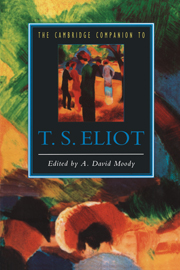Book contents
- Frontmatter
- 1 Where is the real T. S. Eliot? or, The Life of the Poet
- 2 Eliot as a product of America
- 3 Eliot as philosopher
- 4 T. S. Eliot's critical program
- 5 The social critic and his discontents
- 6 Religion, literature, and society in the work of T. S. Eliot
- 7 “England and nowhere”
- 8 Early poems
- 9 Improper desire
- 10 Ash-Wednesday
- 11 Four Quartets
- 12 Pereira and after
- 13 “Mature poets steal”
- 14 Eliot's impact on twentieth-century Anglo-American poetry
- 15 Tradition and T. S. Eliot
- 16 Eliot
- 17 Eliot studies
- A Select Booklist
- Index
14 - Eliot's impact on twentieth-century Anglo-American poetry
Published online by Cambridge University Press: 28 May 2006
- Frontmatter
- 1 Where is the real T. S. Eliot? or, The Life of the Poet
- 2 Eliot as a product of America
- 3 Eliot as philosopher
- 4 T. S. Eliot's critical program
- 5 The social critic and his discontents
- 6 Religion, literature, and society in the work of T. S. Eliot
- 7 “England and nowhere”
- 8 Early poems
- 9 Improper desire
- 10 Ash-Wednesday
- 11 Four Quartets
- 12 Pereira and after
- 13 “Mature poets steal”
- 14 Eliot's impact on twentieth-century Anglo-American poetry
- 15 Tradition and T. S. Eliot
- 16 Eliot
- 17 Eliot studies
- A Select Booklist
- Index
Summary
When I was asked to write on the figure of Eliot in modern poetry I thought of several reasons not to accept. On a personal level I could imagine no way that such critical work would not reveal more about my limitations than about Eliot's powers, since I would miss or mistake crucial aspects of his heritage. And on a theoretical level I deeply mistrust any study claiming to speak of influences. Where such studies are not obvious, they tend to rely on loose speculations about specific echoes or to invoke problematic analogies attempting to establish one writer's shaping overall projects for another.
Yet here I am. The theoretical problem quickly became a challenge to test a concept of impact that might avoid the problems worrying me, since impact is less a matter of one poet deliberately engaging another than it is a matter of the currency of ideas and of a logic informing how writers shape ambitions or develop styles. Thus we shift from trying to inhabit the mind of specific writers to attempting to describe a theater in which Eliot becomes a stimulus focussing a range of possible investments in versions of his work. And then we also shift the personal stakes. My fears did not subside, but they were outweighed by the opportunity to take responsibility for my own love of Eliot: I could ask how and why the now dominant account misses much that was, and is, culturally vital in Eliot's work; and I could use the reception of Eliot's work by other poets to make clear what in his work does not yield to appropriation or modification, but marks instead his still distinctive modernist voice.
- Type
- Chapter
- Information
- The Cambridge Companion to T. S. Eliot , pp. 189 - 209Publisher: Cambridge University PressPrint publication year: 1994
- 3
- Cited by



